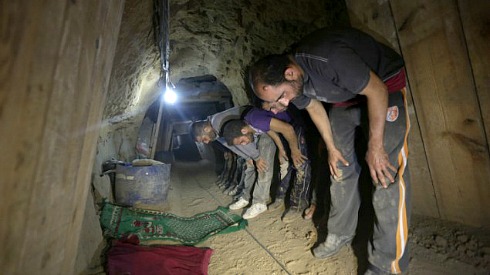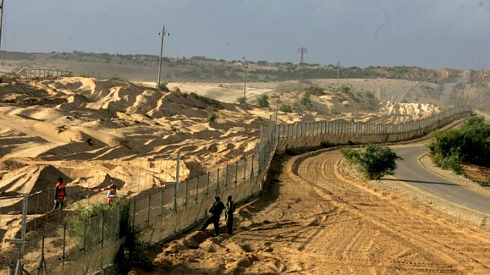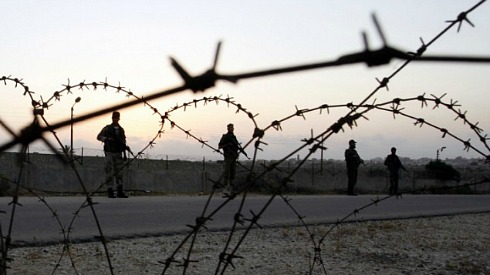INTRATERRORIST COMPETITION….YOU GOT TO LOVE IT
http://nsroundtable.org/as-we-see-it/intra-terrorist-competition/
The nature of weapons flow into Gaza has changed in recent months, with an apparent dip in quantity and rise in quality, according to a senior officer in the IDF (see below).
With ties to Iran in shambles (Hamas publicly broke away from Iran, which for years had funneled arms through Sudan north to the Sinai Peninsula and into Gaza), Hamas in Gaza has been quiet ABOVE ground. Beneath it, however, smuggling of higher-quality weaponry is in full swing. [Quite the industrious bunch, aren’t they?]
Meanwhile, the lack of military aid (from Iran) and the shift away from the radical Hezbollah-Damascus-Iran axis “has rankled the more militant members of [Hamas],” who wrote a letter to Hamas “political leader” Khaled Mashaal, calling for “a rehabilitation of ties with Hezbollah and Iran” and starkly criticizing Hamas’s ties to Qatar and the Gulf State’s recent $400-million gift to Gaza.
Ya gotta love this intra-terrorist competition. Not to mention the piety of the tunnel diggers pictured below…
With Ties To Iran In Shambles, Hamas Finds New Ways To Rearm
Above ground, since Operation Pillar of Defense, Gaza has been quiet. Beneath it, a senior IDF officer explains, smuggling of higher-quality weaponry is in full swing
By Mitch Ginsburg

The nature of the weapons flow into Gaza has changed in recent months, with an apparent dip in quantity and rise in quality, according to a senior officer in the IDF’s Southern Command, who addressed the situation in Gaza and the changes in Hamas since the rise of the Muslim Brotherhood in Egypt.
“There are two parameters — quantity and quality,” said the senior officer. “The quantity appears to have dropped off, but the quality has risen.”
The officer’s comments, delivered recently to the Times of Israel during a tour of the northern part of Israel’s border with Gaza, shed some light on Hamas’s ability to rearm itself in its current position.
The Islamist organization has publicly broken away from Iran, which for years had funneled arms through Sudan north to the Sinai Peninsula and into Gaza. But it has found alternatives.
Ghazi Hamad, the Hamas deputy foreign minister, told The Telegraph in late May that relations with Iran were “bad” and said that, “for supporting the Syrian revolution, we lost very much.” He indicated that military aid from Iran had come to a full stop. “I cannot say there is military cooperation,” he added.
This lack of military aid and the shift away from the radical Hezbollah-Damascus-Iran axis has rankled the more militant members of the organization. “Palestine will be liberated with arms and not with money,” senior members of the military wing of the organization wrote last week to political leader Khaled Mashaal, according to a report in the al-Quds al-Arabi newspaper. The letter, which called for a rehabilitation of ties with Hezbollah and Iran, starkly criticized Hamas’s ties to Qatar and the Gulf State’s recent $400-million gift to Gaza.
The breach with Iran has not put paid to arms importing, however, the senior IDF officer emphasized. Speaking from a guard post just outside the village of Netiv Ha’asara, and just yards from the concrete barrier that partitions Israel and northern Gaza — a border defended by four surveillance balloons, constant patrols, guard towers with remote control-activated machine guns and an array of cameras and radars — he described two concurrent realities: a resounding quiet above ground, and a torrent of activity beneath it.

Rejecting the notion that weapons smuggling had ground to a virtual halt in the wake of the rift with Iran, he described the Gaza Strip as “a termite’s nest,” cut with hundreds of offensive and defensive tunnels, and said that the tunnel industry “is still working well.”
He had no comment about recent reports that no medium-range rockets, such as the Iranian-made Fajr-5, had been smuggled into Gaza since Operation Pillar of Defense. But he did say that advanced weapons were regularly arriving in Hamas hands, perhaps from Libya. “There are lots of anti-tank weapons, including many of the advanced [Russian] Kornet missiles, and there are RPG-7s everywhere,” he said.
The commander of the Gaza region for the Shin Bet during the Second Intifada and the former head of the interrogations directorate for the organization, Arie Livne, supported this assertion in a recent interview.
“If you get weapons for free — great. If not — you buy them,” he said.
A heavy shouldered man with a bushy white mustache, Livne said that “weapons can come in through Sudan and other parts of Africa without having Iran in the picture. Weapons are a very profitable industry.”
Above ground, the officer said, the situation “is quite unbelievable — Hamas has kept it quiet.”
Since Operation Pillar of Defense, he said, “We see many arrests.”

He described seeing Hamas forces on motorcycles swooping in and arresting global jihad groups that have occasionally violated the November 2012 Egypt-brokered ceasefire understanding between Hamas and Israel. They take them in for questioning and scare them and then release them, he said. “It’s not a revolving door; it’s a tactic that works.”
The officer said that Hamas has reconciled the inherent conflict between its terror ideology, which must be launched from the shadows, and its need to visibly govern, by clinging to its ideology but refraining from launching any attacks. “That’s how they avoid this clash,” he said.
The reasons for the organization’s current restraint are threefold, he said. Hamas is still recuperating from Operation Pillar of Defense, building its political and military strength back up; it is “very occupied with the internal struggle” against Fatah for leadership among Palestinians; and its ties with the Muslim Brotherhood-led Egypt, counterintuitively, act as a restraining device and a useful channel of information.
But the officer said he did not believe that the above-ground tranquility would endure indefinitely.
“The quiet is not because they think that terror is the wrong way to win,” he said. “They think it is the right way. But they have patience.”
After a pause, staring at the serpentine barrier and the deep sand on either side — just the sort of earth that lends itself so well to tunneling — he said, “Unless they were able to kidnap another soldier. Then maybe they would not be able to restrain themselves.”
Original article here.
Comments are closed.
